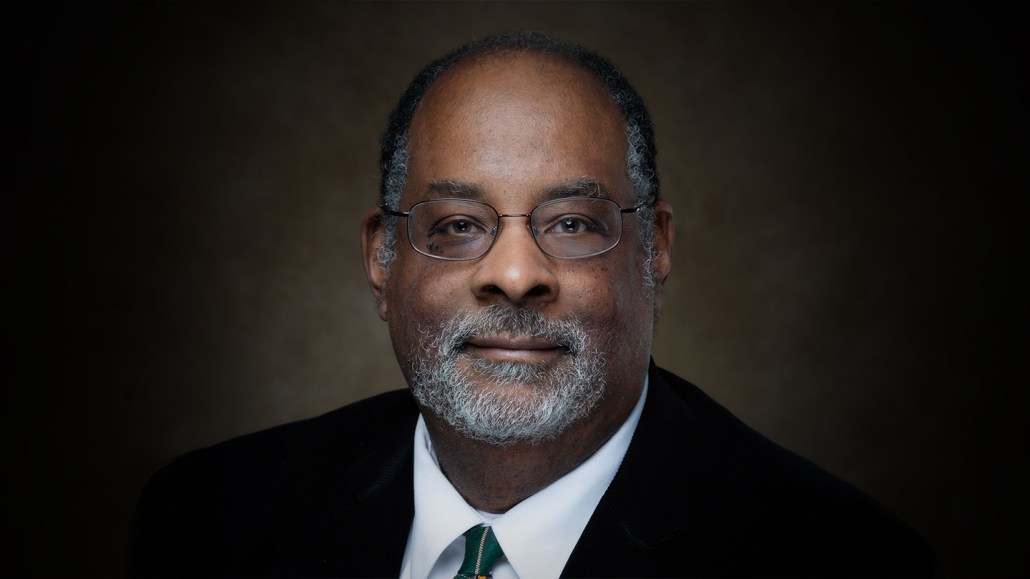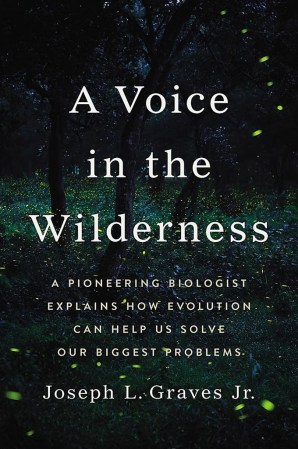Meet the first Black American to earn an evolutionary biology Ph.D.
Joseph L. Graves Jr. offers a memoir and more in ‘A Voice in the Wilderness’

Unlike a lot of the “firsts” among Black Americans earning a Ph.D. in particular fields of science, the first Black evolutionary biologist Ph.D., Joseph L. Graves Jr., is alive and telling his story.
North Carolina A&T Univ.

A Voice in the Wilderness
Joseph L. Graves Jr.
Basic Books, $30
It’s both good and bad that the first Black American to earn a Ph.D. in evolutionary biology is not a long-ago hidden figure but a contemporary scientist. On the upside, there’s no agonizing over papers no one saved, no stitching together other people’s memoirs to guess what pioneering might have felt like. Instead, Joseph L. Graves Jr., who finished his degree in 1988, tells his story himself in A Voice in the Wilderness.
But evolutionary biology’s first Black Ph.D. in 1988? That “first” came late even considering that the field took a while to declare itself a specialty. The Society for the Study of Evolution didn’t form until 1946.
Long before that, U.S. Black biologists had started cracking the glass ceiling of academic credentials. Graves credits Alfred O. Coffin as the first Black American to earn a biological Ph.D., awarded in 1889. He began a slow, intermittent series of Black Ph.D. biologists, who also struggled to get jobs befitting their credentials. Even now, while nearly 14 percent of the U.S. population is Black, Black scientists make up only about 3 percent of the resident Ph.D.s working in a biological discipline.
Showing how racism narrows the gateways to science becomes a major theme in A Voice in the Wilderness as Graves describes his own twisty, bruising path to becoming a “first.” Yet he declares that the book isn’t an autobiography but a call to embrace evolutionary science as crucial to the times we live in. Voice feels like a long, candid, free-flowing conversation. Graves mixes in bitter and sweet childhood memories, the lab challenges of coaxing insects to fly in place, quick math and science explainers, enthusiastic accounts of the scientific questions that drew him to the field, vignettes from his political activism, his alienation from and return to Christianity, some Star Trek…
Graves has already published on why Black evolutionary biologists are rare, lamenting the longtime lack of an inclusive culture and the few, often barely visible, role models. Also, evolutionary biology has baggage. He described in his 2001 book, The Emperor’s New Clothes, a long whack-a-mole history of serial racist pseudoscience. Polygeny, for instance, a popular 19th century delusion, held that races had independent origins and were separate species. In the 20th century, the selective breeding notions of eugenics supposedly justified forced sterilizations and exterminations to purge unwanted traits as if people were livestock. Misuse of science continues, though Graves highlights a few heroes who have summoned science to fight the perversions.
First Black U.S. Ph.D.s in their fields
Black talent in the United States long contributed to science without Ph.D.s, but breaking through the barriers to earn the formal credentials was also a major achievement. Alfred O. Coffin is credited as the first Ph.D. biologist, earning his degree in 1889. Here are examples of other pioneering Black Ph.D.s (from a 1997 accounting). New scholarship may unearth even earlier pioneers but being second or third was still hard work.
1876: Physicist Edward Alexander Bouchet
1907: Entomologist Charles Henry Turner
1915: Physiologist Julian Herman Lewis
1916: Chemist St. Elmo Brady
1921: Botanist Thomas Wyatt Turner
1925: Mathematician Elbert Frank Cox
1930: Anatomist Roscoe Lewis McKinney
1942: Geologist Marguerite Thomas Williams
Source: C. Titcomb/The Journal of Blacks in Higher Education 1997
Graves’ own path was not easy. His parents were born in 1920s Virginia. His grandfather started the migration north after a tip that the Ku Klux Klan was about to target him. His moonshine was getting too competitive with white suppliers’.
“Both my parents grew up under the constant threat of the lynch rope should they in any way sass a white person,” Graves writes. He was born in New Jersey in 1955. “Four months after I was born, young Emmett Till was lynched in Money, Mississippi, for supposedly doing just that.”
Graves attended largely white-majority schools that didn’t see his potential. His mother, Helen, was the advocate who won him his education. For instance, she fought back when his elementary school pushed to move him into “special education.” Then in third grade, eye tests revealed that what he really needed were glasses. New possibilities dawned.
Another critical boost came from a student teacher who noticed that the library books he read were more complicated than his classmates’ reading. At the age of 13, for instance, he was fascinated by Charles Darwin’s On the Origin of Species and wowed by Karl Marx’s Manifesto.
At another turning point, he convinced some kids playing chess to let him have a try. He lost badly but found two chess books in the library that he devoured that night. “In hindsight, I credit chess with being the most important factor changing the trajectory of my life,” he writes. He played on the school team and made lifelong friends.
His path through higher education got complicated. He went to Oberlin College in Ohio because its recruiting brochures had pictures of students who looked like him. There were still some tough spots. He and many other students struggled with freshman physics. Yet, as far as he could tell, he and the class’s other Black student were the only ones to get their final exams back marked, “You have no talent for physics, you should never take another physics class at this college.” Graves avoided physics, but the other student went on to earn a physics Ph.D. at MIT.
While studying parasites for his master’s degree, Graves discovered that his ability to spot weaknesses in current knowledge, which led him to overthink exam answers in his earlier school days, became a strength in research.
For his Ph.D., at first he wanted to go to Harvard University despite his experiences on campus visits. He recalls “European American students coming back and locking their offices or removing valuables from sight when I walked through the common area.”
The National Science Foundation awarded him a fellowship in 1979, not just honoring his talent but offering schools the catnip of full funding for his tuition and support. “I suspect I am the only person in the history of the [fellowship] to be rejected for admission to a graduate program in the same year the award was made,” he writes. Harvard informed him that he was qualified but that no one could be found to advise him.
So he happily plunged into the intellectual fizz of the University of Michigan. Yet passionate political activism eventually pulled him away. He organized efforts to stop Klan threats against Black Americans moving into Detroit suburbs. He went to the United Kingdom to stand arm in arm with the wives of striking miners as police charged them.
First Black U.S. faculty hires
Even after Black Americans began earning Ph.D.s , finding a faculty position at highly ranked, white-majority universities was just about impossible for decades. Harvard University’s dental school, one of the rare white-majority dental schools to take Black students, hired one of its own graduates, George F. Grant, in 1870. A survey published in 2007, however, didn’t find other examples of openly Black teaching faculty scholars at high-profile, white-majority schools — in any academic discipline — until 72 years later. Here’s a sampling of when a few select schools hired their first Black faculty.
1870: George F. Grant – Harvard University
1942: W. Allison Davis – University of Chicago
1952: Joseph T. Gier – University of California, Berkeley
1953: William F. Strother – Princeton University
1956: Joseph R. Applegate – MIT
1962: Michael G. Cooke – Yale University
1970: James Lowell Gibbs Jr. – Stanford University
Source: The Journal of Blacks in Higher Education 2007–2008
Graves returned to academics and finished his Ph.D. in 1988 at Wayne State University in Detroit. His career took off as he worked on the evolutionary genetics of aging, and in 1994 he was elected a fellow of the American Association for the Advancement of Science. Today, he’s a professor at North Carolina A&T State University, a historically Black school.
In keeping with his activist past, Graves uses his evolutionary expertise to fight racism that claims a basis in science and to advocate for a culture that values scientific reasoning. The book’s title comes from the biblical phrase, “I am the voice of one calling in the wilderness, ‘Make straight the way for the Lord.’” It has become a metaphor, Graves says, “for any perspective of great importance and truth that has been silenced to maintain the status quo.” He is far from silenced.







